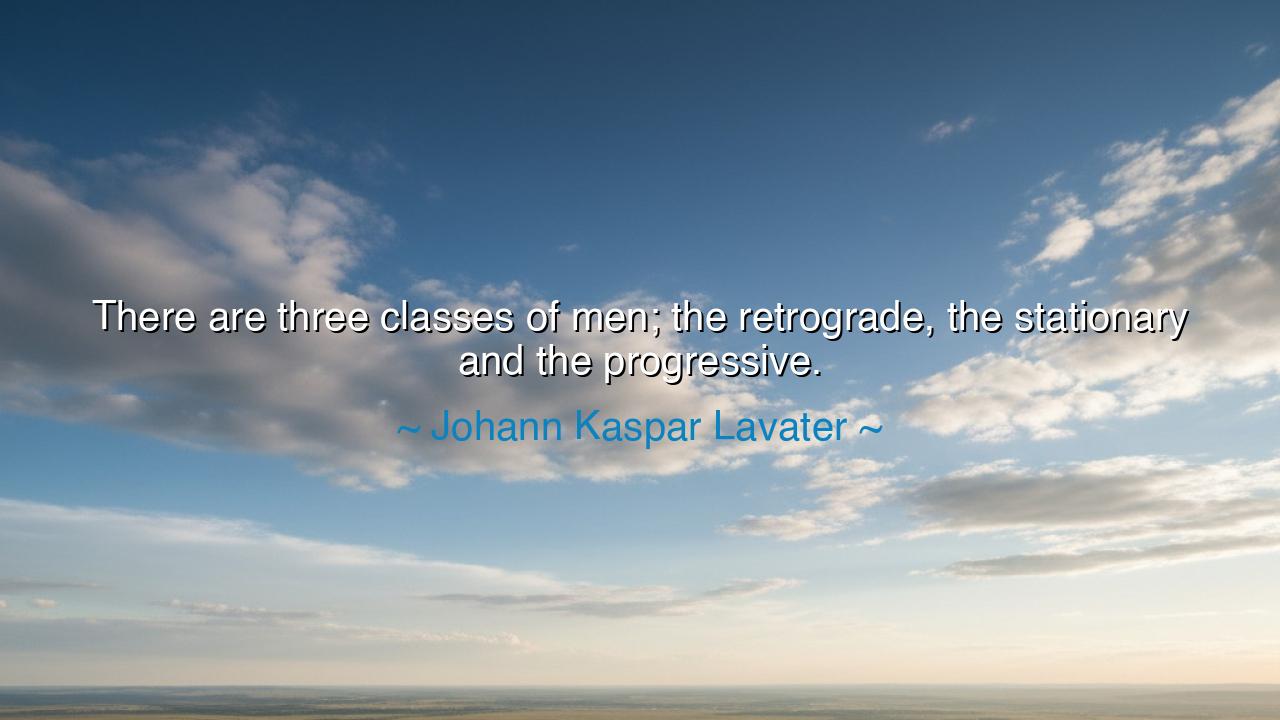
There are three classes of men; the retrograde, the stationary






Johann Kaspar Lavater, the Swiss philosopher and seeker of the human spirit, once declared: “There are three classes of men; the retrograde, the stationary, and the progressive.” These words, though simple, ring like a bell of judgment upon the soul of mankind. For they divide not by birth, nor wealth, nor nation, but by motion—whether the spirit falls backward, stands still, or advances ever forward.
The retrograde are those who move against the current of truth. They cling to corruption, they drag themselves and others back into the mire of ignorance and fear. Their steps erase progress, their voices smother freedom. Such men are not merely stagnant; they are destructive, for they undo what has been built, and their hearts rejoice in the shadows of the past. History knows them well: tyrants who revived cruelty when mercy had been planted, rulers who restored chains when freedom had been won.
The stationary are those who neither advance nor regress. They do not destroy, but neither do they create. Content with comfort, they tread water in the river of time, unwilling to swim toward the future. These men may appear harmless, but their inaction becomes a silent betrayal. For while they stand idle, evil advances unchecked, and opportunity slips away. They are like fields left untilled: not poisoned, but barren. Their lives are neither remembered with hatred nor celebrated with honor; they are forgotten.
The progressive, however, are the torchbearers of humanity. They are the builders of new cities, the seekers of wisdom, the breakers of chains. The progressive do not rest upon yesterday’s victories but strain forward toward tomorrow’s hope. They are often scorned in their time, mocked as dreamers, rebels, or fools, but it is upon their shoulders that the world rises. Consider Galileo, condemned for declaring the Earth moved; consider abolitionists, cursed and persecuted before slavery fell; consider women who demanded rights long before society would yield. These were progressive souls, and their courage became the inheritance of all.
History gives us countless examples of these three classes clashing in one age. During the American Civil War, the retrograde sought to preserve slavery, the stationary wished for compromise and quiet, but the progressive demanded that liberty be made whole. It was the courage of the progressive—Lincoln, Douglass, Tubman, and countless unnamed—that carried the cause to victory. In that struggle, we see Lavater’s truth unveiled: the world is moved forward only by those who dare to progress, while the idle and the backward resist the march of justice.
O children of tomorrow, take this teaching into your hearts: you must choose your place. Do not be among the retrograde, who poison the wells of the future. Do not be among the stationary, who waste the gifts of time by standing still. Be among the progressive, even if the path is steep, even if the world mocks you, even if your labor seems too great. For it is better to stumble forward than to rest content in the dust or to march backward into darkness.
Therefore, the lesson is clear: life itself demands motion. Every soul is either rising or sinking, either shaping the future or surrendering it. Ask yourself each day: Am I regressing? Am I merely standing still? Or am I progressing toward wisdom, justice, and truth? Let your answer be written not in words but in deeds. Build, seek, strive—be a progressive soul, and the generations to come will bless your name.
Thus Lavater’s words endure as a dividing line across all of time: “There are three classes of men; the retrograde, the stationary, and the progressive.” Choose well, for in that choice lies the measure of your life and the destiny of the world.






AAdministratorAdministrator
Welcome, honored guests. Please leave a comment, we will respond soon